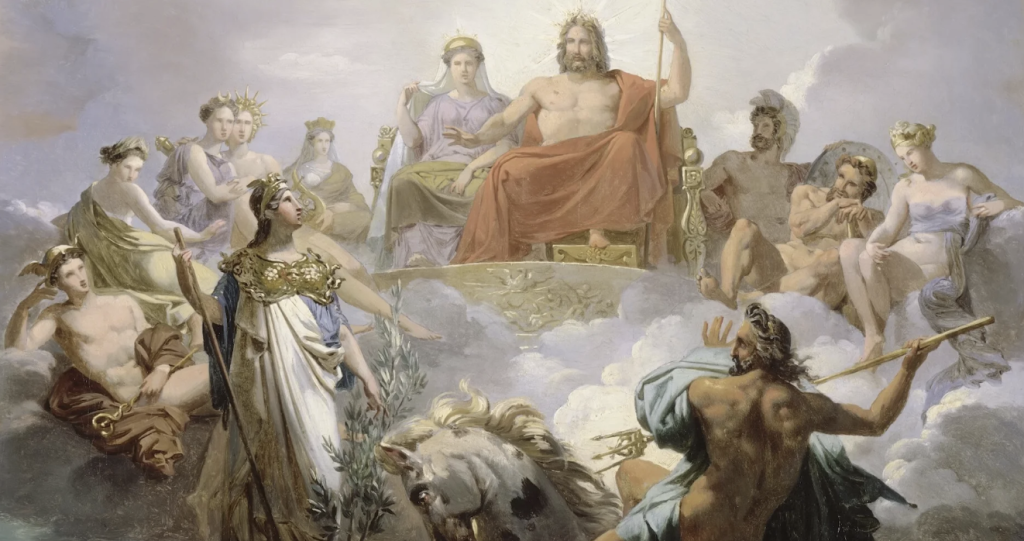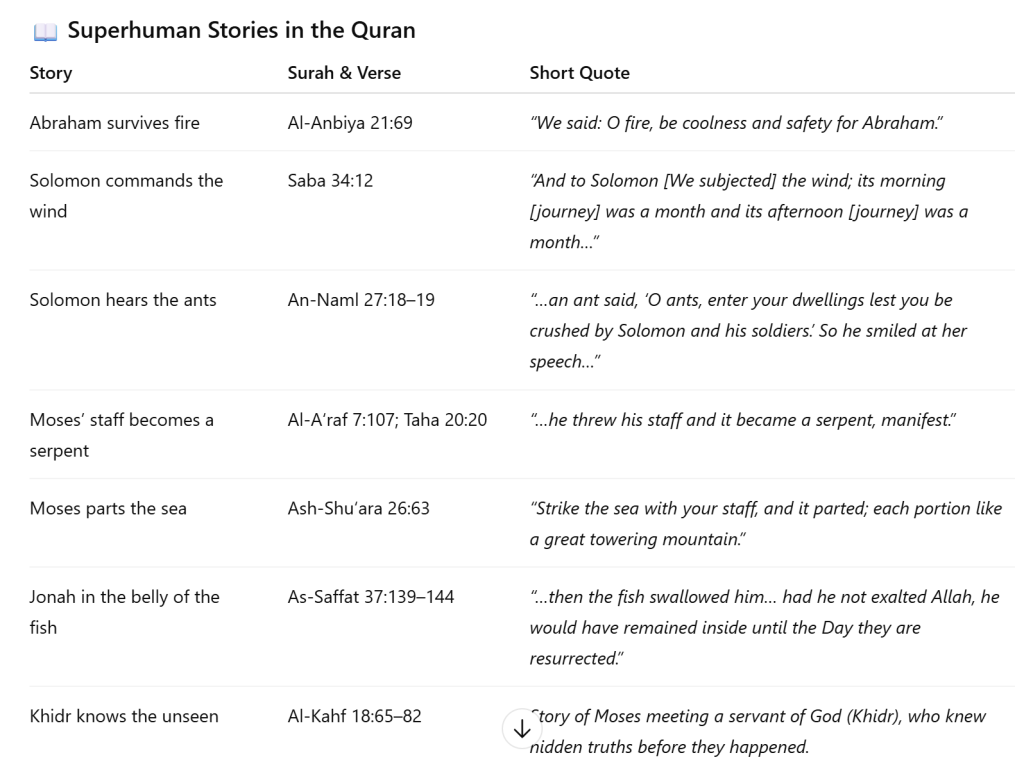
From fireproof prophets (Abraham) to talking ants (sSolomon), miracle stories sound like mythology today. But did the Quran already prepare for this problem with a built-in way out?
Introduction
Let’s be honest: if you hear about a man who walks out of fire untouched, another who talks to ants, a prophet who controls the wind, and someone else who lives inside a giant fish — your first thought wouldn’t be “science,” but mythology. These sound like Greek legends, Marvel comics, or fantasy novels. Yet they are the miracle stories found in the Quran.
For centuries, believers accepted them without question. But in the modern age, shaped by physics, biology, and acoustics, such stories become impossible to swallow literally. And here’s the shocking twist: the Quran may have brilliantly anticipated this problem and left an escape clause — a verse that lets believers retreat to metaphor when miracles stop making sense.
Superhuman Stories in the Quran
The Quran is filled with what we might call “superhuman stories”:
- Abraham survives being thrown into fire, walking away unharmed (Al-Anbiya 21:69).
- Solomon commands the wind, traveling great distances in a day (Saba 34:12).
- Solomon hears the voices of ants in their own language (An-Naml 27:18–19).
- Moses splits the sea into towering walls of water (Ash-Shu‘ara 26:63).
- Moses throws down his staff and it becomes a serpent (Al-A‘raf 7:107; Taha 20:20).
- Jonah is swallowed by a fish yet survives inside it (As-Saffat 37:139–144).
- Khidr knows hidden events before they occur, including death and future consequences (Al-Kahf 18:65–82).
For a 7th-century audience, these were powerful tales. The ancient world was a world of myth: Greek gods hurled thunderbolts, Norse gods walked the earth, and Hebrew prophets summoned plagues. The Quran’s stories fit neatly into this storytelling tradition.

Abraham survives fire → Surah Al-Anbiya 21:69
“We said: O fire, be coolness and safety for Abraham.”Solomon commands the wind → Surah Saba 34:12
“And to Solomon [We subjected] the wind, its morning [journey] was a month and its afternoon [journey] was a month…”Solomon hears the ants → Surah An-Naml 27:18–19
“…until, when they came upon the valley of the ants, an ant said, ‘O ants, enter your dwellings that you not be crushed by Solomon and his soldiers…’ So he smiled, amused at her speech…”Moses’ staff becomes a serpent → Surah Al-A’raf 7:107; Taha 20:20
“…he threw his staff and it became a serpent, manifest.”Moses parts the sea → Surah Ash-Shu‘ara 26:63
“Then We inspired to Moses, ‘Strike the sea with your staff,’ and it parted, and each portion was like a great towering mountain.”Jonah in the belly of the fish → Surah As-Saffat 37:139–144
“And indeed, Jonah was among the messengers… when he ran to the laden ship… then the fish swallowed him while he was blameworthy. And had he not been of those who exalt Allah, he would have remained inside its belly until the Day they are resurrected.”Khidr knows the unseen → Surah Al-Kahf 18:65–82
The story of Moses meeting a servant of God (identified as Khidr), who knew hidden truths of events before they happened.
Mirroring Greek Mythology
The parallels with Greek mythology are uncanny:
- Poseidon rules the seas → Moses parts the waters.
- Aeolus controls the winds → Solomon rides the wind.
- Achilles nearly invincible → Abraham immune to fire.
- Odysseus and Perseus survive sea monsters → Jonah survives in a fish.
- Perseus and Hercules born of divine intervention → Jesus (Isa) born without a father (Maryam 19:16–21).
The pattern is unmistakable: humans with superpowers breaking natural law. Whether called demi-gods or prophets, they function as larger-than-life heroes designed to inspire awe.
The Scientific Problem
Fast-forward to the modern age. Science enters the stage and asks hard questions:
- Physics: fire burns flesh. How could Abraham survive flames?
- Biology: a fish stomach is acidic, lacks oxygen, and digests tissue. How could Jonah live inside one?
- Acoustics: ants communicate with vibrations and pheromones, often below human hearing. How could Solomon hear them?
- Medicine: resurrection contradicts our understanding of biology. How could Jesus raise the dead (Al-Ma’idah 5:110)?
For the scientifically minded, the answer is clear: these events are biologically and physically impossible.
The Escape Clause
But here’s the genius move: the Quran embeds a safety mechanism.
“And these parables We set forth for mankind, but none will understand them except those of knowledge.”
(Al-Ankabut 29:43)
In one stroke, the Quran reframes the miraculous: they might not be literal, but parables (amtsal). Metaphors. Allegories. Teaching devices.
This is the escape clause. If someone in the 21st century balks at the idea of talking ants or fireproof bodies, the believer can reply: “You don’t get it — it’s symbolic, not literal.”
Symbol Over Literal
Look at how neatly the miracles translate into metaphors:
- Abraham in the fire → faith unshaken under trial.
- Moses parting the sea → liberation from tyranny.
- Solomon hearing ants → wise leadership that listens even to the smallest voices.
- Jonah in the fish → despair, repentance, and redemption.
- Khidr’s foresight → the mystery of destiny and divine wisdom.
Suddenly, what once seemed biologically absurd becomes morally profound. The impossible turns into timeless metaphor.
Coincidence or Brilliant Design?
The question is: did the Quran brilliantly anticipate that one day humans would no longer believe in miracle stories literally? Or was it just using a rhetorical device common in ancient texts, which later generations reinterpreted as a clever loophole?
- Believers say: this proves timelessness. The Quran was designed to survive every age, even the age of science.
- Skeptics say: it’s narrative genius, not divine foresight — a built-in insurance policy so the text can never be fully disproven.
Either way, the outcome is the same: the Quran is unfalsifiable.
Why It Matters
This matters because billions of Muslims today still believe literally in these superhuman stories. Children are taught that Abraham was fireproof, Solomon spoke to ants, Jonah survived in a fish. Yet at the same time, educated Muslims can switch to the metaphorical reading when confronted with science.
That duality — literal for the faithful, metaphorical for the skeptical — makes the Quran almost bulletproof. It can comfort the traditional villager and challenge the modern scientist, all at once.
Myth, Scripture, and Survival
Humans have always needed superhuman stories. From Zeus and Hercules to Abraham and Solomon, from Odysseus to Jonah, from Achilles to Jesus — these figures embody humanity’s longing to transcend our limits.
But only the Quran embeds a meta-commentary: a line that says, essentially, “These are parables. Only the wise will understand.” This transforms potential weakness (implausible miracles) into enduring strength (flexible interpretation).
Conclusion
How the Quran brilliantly anticipated the age of science lies in this dual structure: it tells miraculous stories that matched the myth-filled worldview of its time, yet embeds a verse that allows metaphorical reinterpretation whenever literal belief becomes difficult.
For the faithful, this secures timelessness — miracles can always be read in ways that survive modern scrutiny. For skeptics, it reveals narrative genius — a clever safeguard that ensures the text’s relevance no matter the era.
Beware, human! This article could deliver a shocking challenge to believers’ faith.
Support This Project
SEJARAHID.COM is an independent project that I build and maintain with my own time and resources. Like Wikipedia, this site is freely available for anyone to read — but running it still requires hosting, maintenance, and effort.
If you find value in my work and would like to help keep this project alive and growing, I warmly welcome sponsors and donations. Your support will directly contribute to covering hosting costs and ensuring more thought-provoking articles like this can be published in the future.
Like Wikipedia, this project is free — but I welcome sponsors to help cover web hosting cost ….
and buy a Ferrari someday 🚗💨.

- Email paypal : ifafira@gmail.com